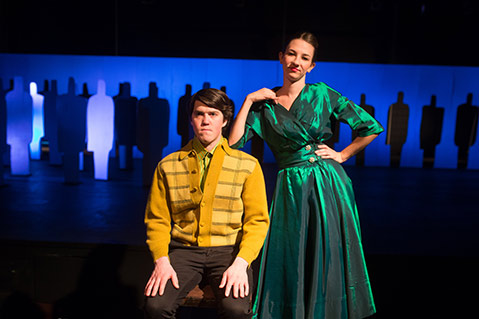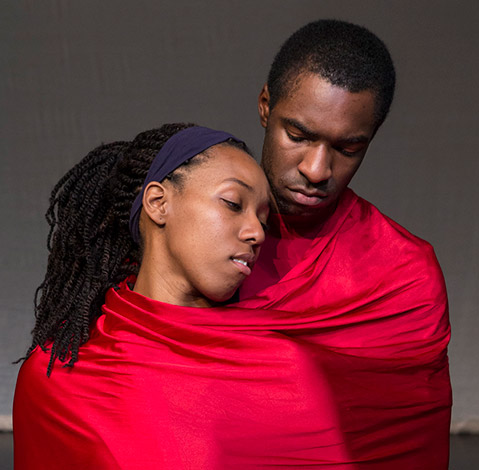Westmont, UCSB Theater Go Into the Woods and the Water
In the Red and Brown Water, The Insect Comedy Premiere on February 27

Men are gods; men are beasts. Both metaphors bear the ring of truth, depending upon which aspects of human life you focus on, and both have been used by great writers to help us understand our own baffling behavior. Joseph Campbell argued we should study the gods of ancient mythology since we so often act in ways that mimic the patterns they set millennia ago. More pessimistic thinkers suggest that, at our core, we have never truly risen above the instinct-driven impulses of our ancestors further down the evolutionary ladder. These themes — which aren’t necessarily in conflict with one another — will be brought to vivid life in two theatrical productions opening Friday night on area campuses.
Tarell McCraney’s In the Red and Brown Water, a new play that finds mythic resonance in contemporary characters, will be staged at UCSB. The Insect Comedy, a nearly century-old Czech play in which human behavior is compared to that of ants, bees, and flies, will be produced at Westmont College. For all their differences, both works eschew realism for a heightened theatricality, and both invite us into exotic worlds that gradually reveal their similarities to our own.
“It is our nature that we wear these archetypes,” declared Shirley Jo Finney, who is directing the UCSB production. The Los Angeles–based director knows the work well: She staged it at the Fountain Theatre in Hollywood to critical acclaim in 2012.
McCraney, a young African-American playwright who was awarded a MacArthur Fellowship (aka Genius Grant) in 2013, set the play in what he calls the “distant present.” Based loosely on Federico García Lorca’s 1934 classic play Yerma, it focuses on a young woman coming of age in an impoverished town in the Louisiana delta. Blessed with superb athletic skills, Oya — her name and personality are taken from the mythology of the Yoruba people, who live in present-day Nigeria — seems to have a way out of her dismal surroundings. But when she postpones college to take care of her aging mother, her opportunities dry up, and she soon finds herself with few options beyond having a child.
What’s more, even that ambition proves beyond her reach. “Like Yerma, Oya becomes obsessed with her infertility,” wrote Washington Post critic Peter Marks, who raved about the play. “It’s a metaphor for diminishment, her failure to thrive.” Desolate and torn between two men, her trajectory is a tragic one.
If Oya’s story sounds familiar, the way it is told here is most definitely not. According to Finney, McCraney is reaching back to an ancient tradition in which “the tribe gathers into a circle to be told a story about who they are.” To re-create that sense of intimacy and inclusion, the actors “introduce themselves and tell you what they are about to do,” Finney explained, noting that they regularly recite the stage directions out loud. “All this is new to them. Besides all the beautiful language, they’re doing ritual dancing, a cappella music, and direct address to the audience.”

Together, these techniques “force them to move beyond ‘acting,’ in terms of portraying a character, and assume a state of being,” she added. “It forces them into a state of emotional truth, because they become so invested in the storytelling.”
John Blondell’s students at Westmont College are similarly used to being stretched, and The Insect Comedy asks a lot from them. “It would be easy to do a kind of children’s show version of this play, where the actors wear funny bug costumes,” he said. “We’re not doing that.
“I’m trying to create evocative patterns and ways of organizing the stage that feels like [the behavior of] insects, in their way of moving, forming, dispersing, and coalescing. But we’re playing the characters as human. It’s not realistic acting, but they’re not making cricket faces.”
The Insect Comedy brings to mind both George Orwell’s Animal Farm and the masterpieces of the Theatre of the Absurd movement, but it predates both. Written by brothers Karel and Josef Čapek, it premiered in 1922 and was staged in London and on Broadway soon thereafter. A 1960 revival in New York City featured a promising young actress named Barbra Streisand.
Performances in recent decades have been few and far between, largely due to the play’s enormous size: There are close to 40 characters, who will be played by 19 actors at Westmont. But some theater scholars consider it a neglected classic, and a 1999 production inspired a Chicago Sun-Times critic to remark that its “keen observations of the life cycle, and poignant visions of war’s futility, remain relevant to this day.”
“It’s a very philosophical play,” said Blondell, whose productions with his professional Lit Moon Company have dazzled audiences in Europe and China, as well as Santa Barbara. “Conformity and freedom are two of its big themes. … It asks, among other things, ‘What does it mean to belong?’ and ‘What do we have to conform to?’ We belong to certain groups, but at what costs? What are the mechanisms that turn us into worker bees who have lost the spirit of life?”
The Insect Comedy begins with a character called the Vagabond, a person “on the fringe of human society,” in Blondell’s words. She falls asleep in the woods and finds herself in the company of various groups of insects, who behave in ways that will be uncomfortably familiar to human audiences.
“There’s a Mr. and Mrs. [Dung] Beetle, who are protecting their little pile of poop,” the director noted. “They decide they need to get another, and then a third. So the satire [of human greed] is quite overt. But there’s also darker material. The crickets are just trying to find a place to live, but the place they find turns out to be the lair of a fly, who kills the crickets to feed to its larvae. He’s a killer, but he’s just surviving and providing for his family.”
As that subplot suggests, the play “is not ha-ha funny,” despite its title, according to Blondell. “It’s more like Dante’s Divine Comedy — more of a grand moral allegory. In many ways, it feels like a medieval morality play, with a representative human figure, around which are orbiting all sorts of personifications of different questions of what it means to be human.”
Across town at UCSB, McCraney is asking some of those same fundamental questions. “In the Yoruba religion, there is no judgment in terms of the choices you make,” director Finney said, “but once you make your choice, you alone are responsible for the consequences.”
Even if the result is that you get squashed like a bug.
4•1•1
In the Red and Brown Water opens on Friday, February 27, at 8 p.m. and continues through March 7 at UCSB’s Hatlen Theater. There is a 2 p.m. matinee on Sunday, March 1. For tickets and info, call (805) 893-2064 or visit www.theaterdance.ucsb.edu. The Insect Comedy opens on Friday, February 27, at 8:30 p.m. and continues through March 7 at Westmont’s Porter Theatre. For tickets and info, call (805) 565-7140 or visit westmont.edu/boxoffice.



